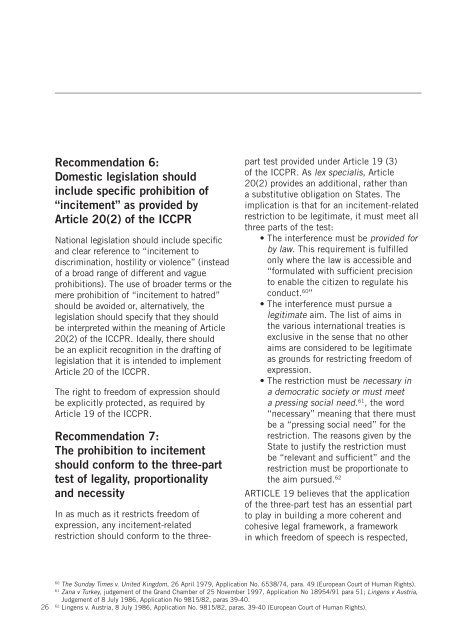ARTICLE-19-policy-on-prohibition-to-incitement
ARTICLE-19-policy-on-prohibition-to-incitement
ARTICLE-19-policy-on-prohibition-to-incitement
You also want an ePaper? Increase the reach of your titles
YUMPU automatically turns print PDFs into web optimized ePapers that Google loves.
Recommendati<strong>on</strong> 6:<br />
Domestic legislati<strong>on</strong> should<br />
include specific prohibiti<strong>on</strong> of<br />
“<strong>incitement</strong>” as provided by<br />
Article 20(2) of the ICCPR<br />
Nati<strong>on</strong>al legislati<strong>on</strong> should include specific<br />
and clear reference <strong>to</strong> “<strong>incitement</strong> <strong>to</strong><br />
discriminati<strong>on</strong>, hostility or violence” (instead<br />
of a broad range of different and vague<br />
prohibiti<strong>on</strong>s). The use of broader terms or the<br />
mere prohibiti<strong>on</strong> of “<strong>incitement</strong> <strong>to</strong> hatred”<br />
should be avoided or, alternatively, the<br />
legislati<strong>on</strong> should specify that they should<br />
be interpreted within the meaning of Article<br />
20(2) of the ICCPR. Ideally, there should<br />
be an explicit recogniti<strong>on</strong> in the drafting of<br />
legislati<strong>on</strong> that it is intended <strong>to</strong> implement<br />
Article 20 of the ICCPR.<br />
The right <strong>to</strong> freedom of expressi<strong>on</strong> should<br />
be explicitly protected, as required by<br />
Article <str<strong>on</strong>g>19</str<strong>on</strong>g> of the ICCPR.<br />
Recommendati<strong>on</strong> 7:<br />
The prohibiti<strong>on</strong> <strong>to</strong> <strong>incitement</strong><br />
should c<strong>on</strong>form <strong>to</strong> the three-part<br />
test of legality, proporti<strong>on</strong>ality<br />
and necessity<br />
In as much as it restricts freedom of<br />
expressi<strong>on</strong>, any <strong>incitement</strong>-related<br />
restricti<strong>on</strong> should c<strong>on</strong>form <strong>to</strong> the threepart<br />
test provided under Article <str<strong>on</strong>g>19</str<strong>on</strong>g> (3)<br />
of the ICCPR. As lex specialis, Article<br />
20(2) provides an additi<strong>on</strong>al, rather than<br />
a substitutive obligati<strong>on</strong> <strong>on</strong> States. The<br />
implicati<strong>on</strong> is that for an <strong>incitement</strong>-related<br />
restricti<strong>on</strong> <strong>to</strong> be legitimate, it must meet all<br />
three parts of the test:<br />
• The interference must be provided for<br />
by law. This requirement is fulfilled<br />
<strong>on</strong>ly where the law is accessible and<br />
“formulated with sufficient precisi<strong>on</strong><br />
<strong>to</strong> enable the citizen <strong>to</strong> regulate his<br />
c<strong>on</strong>duct. 60 ”<br />
• The interference must pursue a<br />
legitimate aim. The list of aims in<br />
the various internati<strong>on</strong>al treaties is<br />
exclusive in the sense that no other<br />
aims are c<strong>on</strong>sidered <strong>to</strong> be legitimate<br />
as grounds for restricting freedom of<br />
expressi<strong>on</strong>.<br />
• The restricti<strong>on</strong> must be necessary in<br />
a democratic society or must meet<br />
a pressing social need. 61 , the word<br />
“necessary” meaning that there must<br />
be a “pressing social need” for the<br />
restricti<strong>on</strong>. The reas<strong>on</strong>s given by the<br />
State <strong>to</strong> justify the restricti<strong>on</strong> must<br />
be “relevant and sufficient” and the<br />
restricti<strong>on</strong> must be proporti<strong>on</strong>ate <strong>to</strong><br />
the aim pursued. 62<br />
<str<strong>on</strong>g>ARTICLE</str<strong>on</strong>g> <str<strong>on</strong>g>19</str<strong>on</strong>g> believes that the applicati<strong>on</strong><br />
of the three-part test has an essential part<br />
<strong>to</strong> play in building a more coherent and<br />
cohesive legal framework, a framework<br />
in which freedom of speech is respected,<br />
26<br />
60<br />
The Sunday Times v. United Kingdom, 26 April <str<strong>on</strong>g>19</str<strong>on</strong>g>79, Applicati<strong>on</strong> No. 6538/74, para. 49 (European Court of Human Rights).<br />
61<br />
Zana v Turkey, judgement of the Grand Chamber of 25 November <str<strong>on</strong>g>19</str<strong>on</strong>g>97, Applicati<strong>on</strong> No 18954/91 para 51; Lingens v Austria,<br />
Judgement of 8 July <str<strong>on</strong>g>19</str<strong>on</strong>g>86, Applicati<strong>on</strong> No 9815/82, paras 39-40.<br />
62<br />
Lingens v. Austria, 8 July <str<strong>on</strong>g>19</str<strong>on</strong>g>86, Applicati<strong>on</strong> No. 9815/82, paras. 39-40 (European Court of Human Rights).


